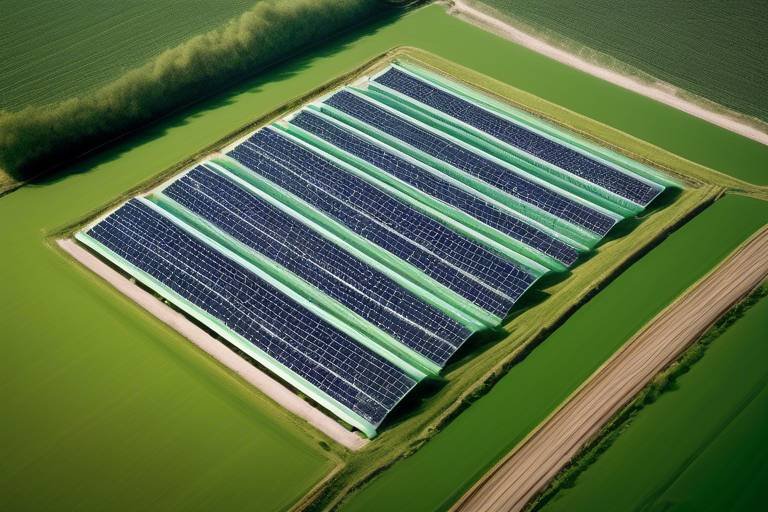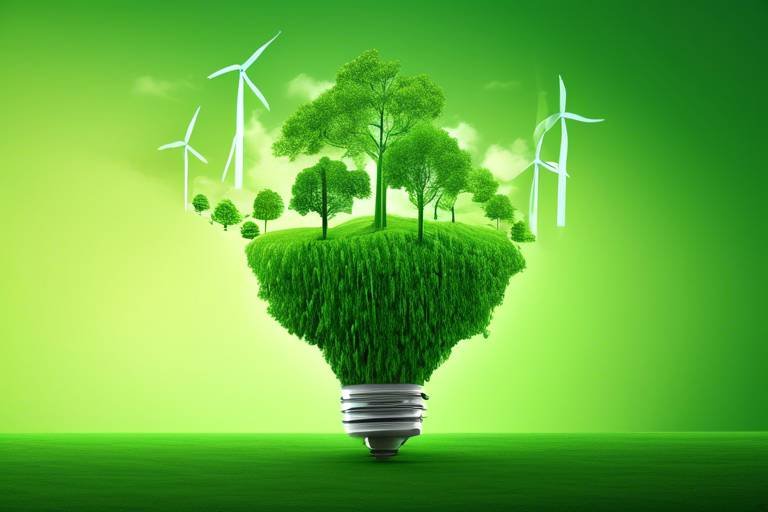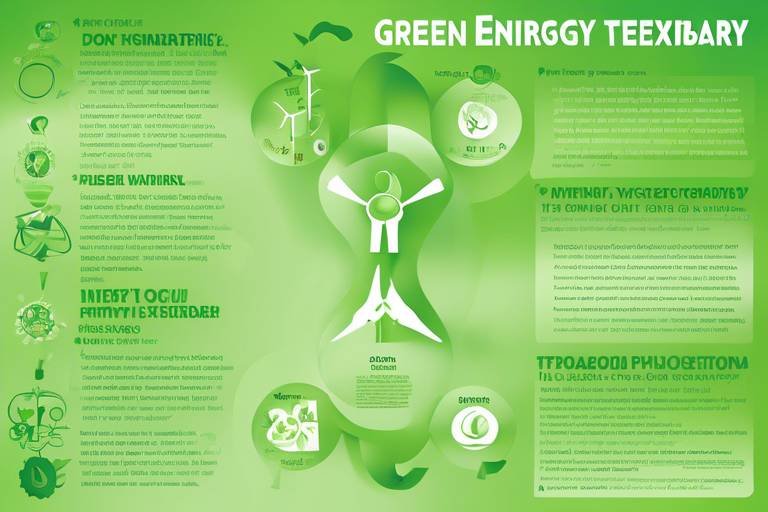How Can Green Energy Solutions Create Jobs?
The world is undergoing a significant transformation, and at the heart of this change lies the concept of green energy solutions. As we strive to combat climate change and reduce our carbon footprint, the shift towards renewable energy sources is not just a necessity but also a tremendous opportunity for job creation. Have you ever wondered how harnessing the power of the sun and wind can translate into new employment opportunities? Well, you're in for a treat! This article delves into the myriad ways green energy solutions are not only reshaping our environment but also fueling economic growth through job creation.
Green energy, encompassing sources like solar, wind, hydro, and geothermal, is on an upward trajectory. According to recent studies, the sector has been expanding at an impressive rate, outpacing traditional energy industries. In fact, the International Renewable Energy Agency (IRENA) reported that renewable energy jobs reached over 11 million globally in 2018, with projections indicating this number could double by 2030. This growth is not just about numbers; it translates into real jobs for real people, impacting communities in profound ways.
As we explore the green energy sector, it's essential to recognize the diversity of roles it encompasses. From manufacturing components for solar panels to installing wind turbines, the job landscape is rich and varied. Here’s a quick snapshot of the types of jobs you might find in the green energy sector:
| Job Type | Description |
|---|---|
| Manufacturing | Production of renewable energy equipment like solar panels and wind turbines. |
| Installation | Setting up solar panels, wind turbines, and other renewable energy systems. |
| Maintenance | Regular upkeep of renewable energy systems to ensure efficiency and longevity. |
| Research and Development | Innovating new technologies and improving existing renewable energy systems. |
But it doesn’t stop there! The ripple effect of job creation in the green energy sector extends far beyond those directly employed in renewable energy. Local economies benefit from increased spending as workers earn wages and invest in their communities. Think about it: when a new solar farm opens in a town, it not only creates jobs for installers and technicians but also boosts local businesses, from restaurants to hardware stores. It's a win-win situation!
In conclusion, green energy solutions are not just a trend; they are a catalyst for job creation and economic growth. By investing in renewable energy, we are investing in a sustainable future that benefits both the planet and its people. So, the next time you hear about a new solar or wind project, remember that it's not just about clean energy—it's about creating jobs and fostering vibrant communities.
- What types of jobs are available in the green energy sector?
There are various roles, including manufacturing, installation, maintenance, and research positions across solar, wind, and other renewable energy sources.
- How can I get trained for a job in green energy?
Many community colleges and technical schools offer training and certification programs specifically tailored for renewable energy careers.
- Are green energy jobs well-paying?
Yes! Many positions in the renewable energy sector offer competitive wages, often higher than traditional energy jobs.
- What is the future outlook for jobs in the green energy sector?
The outlook is very positive, with projections indicating significant job growth as the world continues to shift toward sustainable energy solutions.

The Green Energy Sector
The green energy sector is not just a buzzword; it's a thriving industry that’s reshaping our economy and environment. With the world increasingly recognizing the urgency of combating climate change, investments in renewable energy sources have skyrocketed. This sector encompasses a wide range of activities, from the manufacturing of solar panels to the installation of wind turbines. The growth trajectory of green energy solutions has been nothing short of explosive, creating a plethora of job opportunities that cater to various skill sets and interests.
As we dive deeper into this sector, it's essential to understand the types of jobs being generated. The green energy sector can be broadly categorized into several key areas:
- Manufacturing: This includes the production of solar panels, wind turbines, and other renewable energy technologies.
- Installation: Skilled workers are needed to install solar panels and wind turbines, ensuring they operate efficiently and safely.
- Maintenance: Regular maintenance of renewable energy systems is crucial for longevity and efficiency, creating jobs for technicians and engineers.
- Research and Development: Innovation is at the heart of green energy, necessitating roles in research to develop new technologies and improve existing solutions.
According to a recent report, the global renewable energy sector is projected to create over 24 million jobs by 2030. This staggering number highlights not only the potential for employment but also the significant shift towards sustainable practices in various industries. The jobs created in this sector are often more than just a paycheck; they contribute to a larger purpose of saving our planet. Imagine working in a field where your daily tasks directly impact the environment positively—how rewarding is that?
Furthermore, the green energy sector is proving to be a catalyst for economic growth. Local communities are benefiting from job creation, which leads to increased spending and investment in local businesses. When a new solar farm or wind facility opens, it doesn't just create jobs for the installation crew; it stimulates the local economy by creating demand for services, housing, and more. This ripple effect can lead to a more robust and resilient economic landscape.
In conclusion, the green energy sector is a beacon of hope for job seekers and the environment alike. As we continue to transition towards renewable energy solutions, the opportunities for employment will only grow. Whether you're a seasoned professional or just starting your career, there’s a place for you in this vibrant and essential industry.
Q: What types of jobs are available in the green energy sector?
A: The green energy sector offers a variety of jobs, including roles in manufacturing, installation, maintenance, and research and development. These positions cater to a wide range of skills and experience levels.
Q: How does working in the green energy sector benefit the economy?
A: Jobs in the green energy sector stimulate local economies by increasing spending, creating demand for services, and fostering innovation. This leads to a more resilient economic landscape.
Q: What skills are needed for a career in green energy?
A: Essential skills include technical expertise in energy systems, engineering principles, and environmental science, as well as soft skills like communication and teamwork.

Job Creation in Renewable Energy
When we think about the future, the concept of renewable energy isn't just a buzzword; it's a beacon of hope for job creation across the globe. As countries and companies pivot towards more sustainable practices, the demand for renewable energy sources like solar, wind, and hydroelectric power is skyrocketing. This shift not only addresses the pressing issue of climate change but also opens up a plethora of job opportunities that cater to a wide range of skills and backgrounds. In fact, the renewable energy sector is one of the fastest-growing job markets, and it's transforming the landscape of employment as we know it.
According to recent studies, the renewable energy sector is projected to create millions of jobs in the upcoming years. These jobs span various fields, including engineering, manufacturing, installation, and maintenance. For instance, the International Renewable Energy Agency (IRENA) reported that solar and wind energy alone accounted for over 11 million jobs worldwide in 2018, and this number is expected to double by 2030. The beauty of these jobs is that they are not confined to urban areas; rural communities are also benefiting from this green revolution, as many renewable energy projects are developed in less populated regions.
The job opportunities in renewable energy are incredibly diverse. For example, in the solar energy sector, roles range from installation technicians who physically set up solar panels to sales representatives who educate consumers about the benefits of solar energy. Similarly, the wind energy sector offers positions for engineers who design wind turbines and technicians who maintain these massive structures. Each of these roles plays a crucial part in the renewable energy ecosystem, contributing to a cleaner planet while providing stable employment.
Moreover, the economic benefits of job creation in renewable energy extend beyond just the number of positions available. For every job created in the renewable sector, there are often multiple indirect jobs generated in related industries. For example, when a new solar farm is built, it not only creates jobs for solar panel installers but also stimulates local economies by requiring services like catering, transportation, and construction. This ripple effect can lead to a significant boost in local economies, making renewable energy a win-win situation for both the environment and the workforce.
In addition to traditional job roles, the renewable energy sector is also paving the way for new career paths that didn’t exist a decade ago. As technology evolves, so does the need for specialized skills. For instance, jobs in energy storage, smart grid technology, and energy efficiency consulting are emerging as critical components of the renewable energy landscape. This evolution means that workers in the field must be adaptable and willing to learn new skills continuously, which can lead to a more dynamic and resilient workforce.
Furthermore, the push for renewable energy is not just about creating jobs; it's about creating quality jobs that offer competitive wages and benefits. Many roles in the renewable energy sector come with opportunities for advancement and professional development. As companies invest in training programs and certifications, workers can enhance their skills and move up the career ladder, contributing to a sustainable future while also improving their economic stability.
In conclusion, the transition to renewable energy is not merely a trend; it's a transformative movement that has the potential to reshape our economy and create millions of jobs. As we embrace this green revolution, we are not only investing in a sustainable future but also in a workforce that is equipped to tackle the challenges of tomorrow. So, whether you’re a recent graduate, a seasoned professional, or someone looking to switch careers, the renewable energy sector is ripe with opportunities waiting to be explored.

Solar Energy Jobs
The solar energy industry is booming, and with it comes a plethora of exciting job opportunities that cater to a wide array of skills and interests. From the moment sunlight hits a solar panel to the time the energy is fed back into the grid, there are numerous roles that contribute to this sustainable energy solution. One of the most interesting aspects of solar energy jobs is how they blend technology with environmental stewardship, creating a unique career path for those passionate about making a difference.
At the heart of the solar industry are roles such as solar panel installers, who are responsible for the physical installation of solar systems on rooftops and in solar farms. These professionals not only need to be skilled in construction and electrical work but also require a keen understanding of safety protocols and regulations. The demand for skilled installers is projected to grow significantly, as more homeowners and businesses look to reduce their carbon footprint and harness renewable energy.
Another vital role in the solar energy sector is that of sales representatives. These individuals are the bridge between technology and the consumer, explaining the benefits of solar energy systems, addressing customer concerns, and guiding clients through the purchasing process. Strong communication skills and a passion for renewable energy are essential for success in this role. Additionally, as the market expands, there is a growing need for researchers and engineers who can innovate and improve solar technology, making it more efficient and accessible.
To illustrate the diversity of job roles in the solar energy sector, here’s a quick breakdown:
| Job Role | Description | Skills Required |
|---|---|---|
| Solar Panel Installer | Installs solar panels on residential and commercial properties. | Construction skills, electrical knowledge, safety awareness |
| Sales Representative | Promotes solar products and assists customers in the buying process. | Communication skills, customer service, product knowledge |
| Research Scientist | Develops new solar technologies and improves existing systems. | Analytical skills, engineering principles, creativity |
| Project Manager | Oversees solar projects from inception to completion. | Leadership, organizational skills, budgeting |
As the solar energy sector continues to expand, the need for a skilled workforce is more critical than ever. Companies are increasingly seeking individuals who are not only technically proficient but also possess a passion for sustainability and innovation. This is where training and certification programs come into play, ensuring that workers are equipped with the necessary skills to thrive in this fast-paced environment.
In summary, solar energy jobs are not just about installing panels; they encompass a wide range of roles that contribute to a cleaner, greener future. Whether you're a hands-on installer, a persuasive salesperson, or a brilliant researcher, the solar industry offers a fulfilling career path that aligns with the growing demand for renewable energy solutions. So, if you're looking for a job that combines purpose with passion, the solar energy sector might just be your calling!
Q: What qualifications do I need to work in solar energy?
A: While some roles may require specific degrees or certifications, many positions, especially for installers, may only require vocational training or apprenticeships. Hands-on experience and a willingness to learn are often just as important.
Q: Are solar energy jobs well-paying?
A: Yes, many jobs in the solar industry offer competitive salaries, especially as demand for skilled workers continues to rise. Additionally, as you gain experience and specialized skills, your earning potential can increase significantly.
Q: Is the solar energy industry growing?
A: Absolutely! The solar energy sector is one of the fastest-growing industries globally, driven by the increasing need for sustainable energy solutions and government incentives promoting renewable energy.

Training and Certification Programs
As the green energy sector continues to expand, the demand for a knowledgeable and skilled workforce is more critical than ever. play a pivotal role in preparing individuals for various roles in the renewable energy field. These programs not only equip workers with the necessary technical skills but also enhance their employability in a competitive job market. Imagine stepping into a world where your skills not only contribute to your personal growth but also to the health of our planet—this is the essence of green energy training.
One of the most significant aspects of these training programs is their diversity. They cater to a wide range of roles, from solar panel installation technicians to wind turbine engineers. Many institutions and organizations offer specialized courses, often including both theoretical knowledge and hands-on experience. For instance, a typical solar energy training program might cover:
- Understanding photovoltaic systems
- Installation techniques
- Maintenance and troubleshooting
- Safety protocols
This comprehensive approach ensures that participants are not only well-versed in the technical aspects but also understand the importance of safety and efficiency in their work. Additionally, many programs offer certification upon completion, which can significantly enhance a candidate's resume. Employers often look for certified individuals, as these credentials demonstrate a commitment to the field and a recognized level of expertise.
Moreover, the economic impact of these training programs cannot be overstated. By investing in education and skills development, communities can foster a robust workforce that meets the needs of the growing green energy market. This not only leads to job creation but also stimulates local economies as newly trained workers often spend their earnings within their communities. It's a win-win situation that promotes sustainability while contributing to economic growth.
In summary, training and certification programs are essential for cultivating a skilled workforce in the green energy sector. They provide the necessary tools for individuals to thrive in this dynamic field while simultaneously addressing the pressing need for sustainable energy solutions. As we continue to invest in these educational opportunities, we pave the way for a greener, more sustainable future.
Q: What types of training programs are available for green energy jobs?
A: There are various training programs available, including those focused on solar energy installation, wind turbine maintenance, and energy efficiency auditing. Many programs are offered by community colleges, vocational schools, and online platforms.
Q: Do I need prior experience to enroll in a training program?
A: Most training programs are designed for individuals at all skill levels. Some may require basic knowledge of electrical systems, while others are suitable for complete beginners.
Q: How long do these training programs typically last?
A: The duration of training programs can vary widely. Some may last a few weeks, while others can take several months to complete, depending on the depth of the curriculum and the specific skills being taught.
Q: Are there financial aid options available for these programs?
A: Yes, many institutions offer financial aid, scholarships, or payment plans to help students afford their training programs. It's advisable to research and inquire about these options before enrolling.

Economic Impact of Solar Jobs
The economic impact of solar jobs is profound and far-reaching, influencing not just the individuals employed in the sector but also the communities and economies surrounding them. As the demand for solar energy surges, so does the need for a skilled workforce. This has led to a remarkable increase in job creation, which in turn stimulates local economies. When a new solar installation company opens its doors, it doesn't just hire technicians; it creates a ripple effect that supports various sectors, from manufacturing to retail and beyond.
Let's break it down a bit. When solar jobs are created, local spending increases significantly. Workers in the solar industry typically earn competitive wages, which means they have more disposable income to spend in their communities. This spending can lead to:
- Increased demand for local services such as restaurants, shops, and entertainment venues.
- Growth in housing markets as more workers move into the area for job opportunities.
- Investment in infrastructure improvements, as local governments may see increased tax revenues from a growing economy.
Moreover, the solar industry often offers higher wages compared to traditional fossil fuel jobs. According to recent studies, solar jobs can pay up to 20% more than equivalent positions in non-renewable sectors. This wage premium not only attracts talent but also helps retain workers, creating a stable workforce that is essential for the industry's growth. Furthermore, as companies invest in employee training and development, they enhance the skill sets of their workers, leading to even greater productivity and innovation.
Additionally, investing in solar energy can reduce energy costs for consumers and businesses alike. As solar technology advances and becomes more efficient, the cost of solar energy continues to decline. This means that households and businesses can save significantly on their energy bills, freeing up funds that can be redirected into the local economy. The cumulative effect of job creation, increased local spending, and reduced energy costs can lead to a sustainable economic model that benefits everyone.
In conclusion, the economic impact of solar jobs extends beyond individual employment. It fosters community growth, enhances local economies, and contributes to a more sustainable future. As we continue to embrace solar energy, we not only create jobs but also lay the groundwork for a thriving economy that benefits all.
- What types of jobs are available in the solar energy sector? Solar energy jobs range from installation and maintenance to sales and research positions.
- Are solar jobs well-paying? Yes, many solar jobs offer competitive salaries, often exceeding those in traditional energy sectors.
- How can I get trained for a solar energy job? Many community colleges and vocational schools offer training programs and certifications in solar technology.
- What is the future outlook for solar energy jobs? The future looks bright, with job growth expected to continue as more businesses and homeowners turn to renewable energy sources.

Wind Energy Careers
As the world shifts towards sustainable energy, have emerged as a beacon of opportunity. The wind energy sector is not just about large turbines spinning in the breeze; it encompasses a vast array of roles that contribute to the entire lifecycle of wind projects. From the initial design phase to the installation and ongoing maintenance, the demand for skilled professionals in this field is skyrocketing. Imagine being part of a team that harnesses the power of the wind to generate clean electricity—it's not just a job; it's a mission to create a better future.
One of the most exciting aspects of wind energy careers is the diversity of roles available. Engineers, for example, play a crucial role in designing new turbine technologies that can capture more energy efficiently. These roles often require a solid background in mechanical or electrical engineering, as well as a passion for innovation. On the other hand, technicians are the hands-on heroes who ensure that these turbines operate smoothly. They perform routine maintenance checks, troubleshoot issues, and even climb to great heights to conduct repairs. It's a job that demands both technical skill and a healthy dose of bravery!
Moreover, project managers are essential in coordinating the various aspects of wind energy projects. They oversee timelines, budgets, and team dynamics, ensuring that everything runs like a well-oiled machine. This role requires not only technical knowledge but also excellent communication and organizational skills. In essence, the wind energy sector is a melting pot of various talents, each contributing to a common goal: to transition to a cleaner, greener energy future.
As we look at the job market, it's evident that wind energy careers are growing at an impressive rate. According to recent statistics, the wind industry has created over 100,000 jobs in the United States alone, and this number is expected to double in the coming years. The majority of these positions are in states with significant wind resources, such as Texas, Iowa, and Oklahoma. However, opportunities are not limited to these areas; with the rise of remote work and decentralized energy systems, professionals can find roles across the nation.
To give you a clearer picture, here’s a simple table outlining some of the key roles within the wind energy sector:
| Job Title | Key Responsibilities | Required Skills |
|---|---|---|
| Wind Turbine Technician | Maintenance, troubleshooting, and repair of turbines | Technical expertise, climbing skills, safety training |
| Wind Engineer | Design and develop new turbine technologies | Engineering principles, problem-solving, analytical skills |
| Project Manager | Oversee project timelines, budgets, and teams | Leadership, communication, organizational skills |
In addition to the technical and managerial roles, there are also opportunities in research and development, policy-making, and sales. These positions are vital for advancing the technology and marketability of wind energy solutions. For instance, researchers are constantly looking for ways to improve turbine efficiency and reduce costs, while sales professionals work to promote wind energy as a viable alternative to fossil fuels.
So, why should you consider a career in wind energy? Beyond the attractive salary packages and job stability, working in this field means being part of a transformative movement. You're not just clocking in and out; you're contributing to a global effort to combat climate change and promote sustainability. It's a career that offers both personal fulfillment and professional growth, making it an excellent choice for those looking to make a difference.
Q: What qualifications do I need to work in wind energy?
A: While specific qualifications can vary by role, a background in engineering, environmental science, or renewable energy is often beneficial. Many positions also require specialized training or certifications.
Q: Are wind energy jobs available in all regions?
A: Yes, while some states have a higher concentration of wind energy projects, opportunities are expanding nationwide due to the growing demand for renewable energy.
Q: What is the job outlook for the wind energy sector?
A: The job outlook is very positive, with the industry expected to see significant growth in the coming years as more countries commit to renewable energy goals.

Skills Required for Green Jobs
In the rapidly evolving landscape of green energy, having the right skills is crucial for anyone looking to dive into this exciting field. As we transition towards more sustainable energy solutions, the demand for a skilled workforce is increasing at an impressive rate. But what exactly are the skills needed for these green jobs? Let’s break it down.
First and foremost, technical skills are paramount. Professionals in the green energy sector must possess a solid understanding of energy systems, engineering principles, and environmental science. For instance, someone working in solar energy should be familiar with photovoltaic systems, while a wind energy technician must understand turbine mechanics. This technical knowledge not only helps in performing job tasks efficiently but also plays a critical role in troubleshooting and optimizing energy systems. The complexity of these systems often requires workers to be adept at using specialized tools and software, making technical proficiency a non-negotiable skill set.
However, it’s not just about the hard skills. Soft skills are equally important in the green energy sector. Communication skills are essential, especially when it comes to working in teams or explaining complex concepts to clients or stakeholders. Imagine a solar panel installer who can’t clearly communicate the benefits of their work to a homeowner; it could hinder sales and customer satisfaction. Teamwork is another key aspect, as many projects require collaboration among diverse teams of engineers, technicians, and project managers. The ability to work well with others can significantly impact project outcomes and innovation.
Furthermore, adaptability is a skill that stands out in the green energy arena. The industry is constantly evolving with new technologies and practices emerging regularly. Workers must be willing to learn and adapt to these changes, whether it's adopting new software for energy management or staying updated on the latest environmental regulations. This adaptability not only enhances personal career growth but also contributes to the overall success of the organization.
In addition, problem-solving skills are vital. The green energy sector often faces unique challenges, from integrating renewable sources into existing grids to overcoming regulatory hurdles. Employees who can think critically and develop innovative solutions will be invaluable assets to their companies. For example, an engineer tasked with designing a more efficient wind turbine must analyze various factors and come up with creative solutions to improve performance.
To summarize, the skills required for green jobs can be categorized into two main areas: technical skills and soft skills. Here’s a quick overview:
| Skill Type | Examples |
|---|---|
| Technical Skills | Energy systems knowledge, engineering principles, environmental science |
| Soft Skills | Communication, teamwork, adaptability, problem-solving |
As we move forward into a greener future, the demand for skilled workers in the green energy sector will only continue to rise. By focusing on both technical and soft skills, individuals can position themselves for success in this dynamic and rewarding field.
- What are the most in-demand skills in the green energy sector? The most in-demand skills include technical expertise in energy systems, engineering, and strong communication and problem-solving abilities.
- How can I gain the necessary skills for a green job? Consider enrolling in training programs, obtaining certifications, or pursuing degrees related to renewable energy and environmental science.
- Are there specific certifications for green energy jobs? Yes, many organizations offer certifications in solar energy, wind energy, and energy efficiency that can enhance your employability.

Technical Skills
In the rapidly evolving landscape of green energy, having the right is crucial for anyone looking to build a career in this dynamic field. The demand for professionals who understand the intricacies of energy systems, engineering principles, and environmental science is skyrocketing. Why is this knowledge so essential? Because as we transition away from fossil fuels and toward sustainable energy sources, we need skilled individuals who can navigate the complexities of these new technologies. Think of it like learning to drive a car; you wouldn’t want to get behind the wheel without understanding how the vehicle operates, right?
To break it down further, here are some of the key technical skills that are becoming increasingly vital:
- Understanding Energy Systems: Professionals must grasp how various energy systems work, including solar panels, wind turbines, and energy storage solutions.
- Engineering Principles: A solid foundation in engineering principles is necessary for designing and implementing green energy solutions effectively.
- Environmental Science Knowledge: Understanding the environmental impact of various energy sources helps in making informed decisions that benefit both the economy and the planet.
Moreover, as technology advances, the tools and software used in the green energy sector are also evolving. Familiarity with data analysis software, simulation tools, and project management applications can set candidates apart in the job market. For instance, software that models energy consumption patterns is increasingly being used to optimize energy efficiency in buildings. This means that having a knack for technology can be just as valuable as traditional technical skills.
But it’s not just about having the right knowledge; it’s also about applying it effectively. Problem-solving skills are essential in this field, as professionals often face unique challenges that require innovative solutions. For example, when installing solar panels, workers must assess the best placement to maximize sunlight exposure while considering structural integrity and aesthetic factors. This requires a blend of technical know-how and creative thinking.
In conclusion, the green energy sector is not just a job market; it’s a rapidly growing industry that demands a diverse set of technical skills. By equipping oneself with the necessary knowledge and abilities, aspiring professionals can not only secure a position in this exciting field but also contribute to a sustainable future. Just like a well-tuned machine, the synergy between technical skills and innovative thinking will drive the green energy revolution forward.

Soft Skills
In the rapidly evolving landscape of green energy, possessing is just as crucial as having technical expertise. While technical skills can get you through the door, it's the soft skills that will help you thrive and make a real impact in the industry. Think of it like this: technical skills are your toolbox, but soft skills are the hands that wield those tools effectively. So, what exactly are these soft skills, and why are they so important?
First off, communication is key. In any job, but especially in the green energy sector, being able to articulate ideas clearly can make a world of difference. Whether you're presenting a project to stakeholders or collaborating with a team of engineers, effective communication ensures that everyone is on the same page. It also fosters an environment where innovative ideas can flourish. Imagine trying to build a solar panel system without clear instructions—chaos, right?
Next up is teamwork. The green energy industry thrives on collaboration. Projects often require a diverse group of professionals, from engineers and technicians to project managers and salespeople, all working together towards a common goal. Having the ability to work well in a team not only enhances productivity but also sparks creativity. When people from different backgrounds come together, they can generate ideas that one person alone might never think of. It's like mixing different colors of paint; the result can be a masterpiece!
Another essential soft skill is problem-solving. The green energy sector is not without its challenges, whether it's navigating regulatory hurdles or addressing technical glitches. Workers who can think critically and creatively to find solutions are invaluable. They can turn potential setbacks into opportunities for innovation. For instance, if a wind turbine isn't performing as expected, a skilled problem-solver can analyze the issue and implement changes that boost efficiency. This adaptability is vital in an industry that is constantly evolving.
Finally, adaptability itself is a soft skill that cannot be overlooked. The green energy landscape is changing at breakneck speed, with new technologies and regulations emerging regularly. Professionals who can quickly adjust to these changes will not only survive but thrive. Just like a chameleon adapts to its environment, being flexible and open to new ideas can lead to exciting career advancements and opportunities.
In summary, while technical skills lay the foundation for a career in green energy, it's the soft skills that truly elevate a professional's potential. They enable effective communication, foster teamwork, enhance problem-solving capabilities, and promote adaptability. As the industry continues to grow, the demand for individuals who possess both technical and soft skills will only increase, paving the way for a more sustainable future.
- What are soft skills in the context of green energy? Soft skills refer to interpersonal skills that enable effective communication, teamwork, problem-solving, and adaptability in the workplace.
- Why are soft skills important in green energy jobs? They help professionals collaborate effectively, communicate ideas clearly, and adapt to rapid changes in technology and regulations.
- How can I improve my soft skills? Engaging in team projects, seeking feedback, and participating in workshops or training sessions focused on communication and problem-solving can help enhance your soft skills.
Frequently Asked Questions
- What types of jobs are created in the green energy sector?
The green energy sector is booming and offers a variety of job opportunities. You can find roles in manufacturing, installation, and maintenance of renewable energy systems. From solar panel installers to wind turbine engineers, the options are diverse and cater to different skill sets.
- How does renewable energy impact job creation?
Renewable energy is not just about saving the planet; it's also about creating jobs! With the rise of solar and wind energy, communities are seeing new employment opportunities pop up. This sector is particularly beneficial for those looking for jobs across various demographics and regions, helping to boost local economies.
- What specific roles exist within the solar energy industry?
In the solar energy sector, there are several exciting roles available. You could work as an installer, a sales representative, or even dive into research and development. As demand for solar energy grows, so does the need for skilled workers in these areas!
- Are there training programs available for solar energy jobs?
Absolutely! Training and certification programs are essential for anyone looking to break into the solar energy field. These programs equip workers with the necessary skills and knowledge, ensuring a well-prepared workforce ready to tackle the challenges of the renewable energy landscape.
- What economic benefits do solar jobs provide?
Solar jobs do more than just provide employment; they also contribute to the local economy. With higher wages and increased local spending, these jobs help stimulate economic growth. Plus, they often lead to stable career paths, which is a win-win for workers and communities alike!
- What job opportunities are available in the wind energy sector?
The wind energy sector is rich with job opportunities, ranging from engineering roles to operations positions. As we transition to sustainable energy, these jobs are crucial for maintaining and developing wind farms, making it an exciting field to be part of.
- What skills are essential for green energy jobs?
To thrive in green energy jobs, you need a mix of technical skills and soft skills. Technical skills include knowledge of energy systems and engineering principles, while soft skills like communication and teamwork are vital for fostering collaboration in this innovative field.
- Why are soft skills important in the green energy workforce?
Soft skills are the glue that holds teams together in the green energy sector. They promote collaboration and innovation, which are crucial for tackling the complex challenges of renewable energy. Being able to communicate effectively can make all the difference in a project’s success!



















